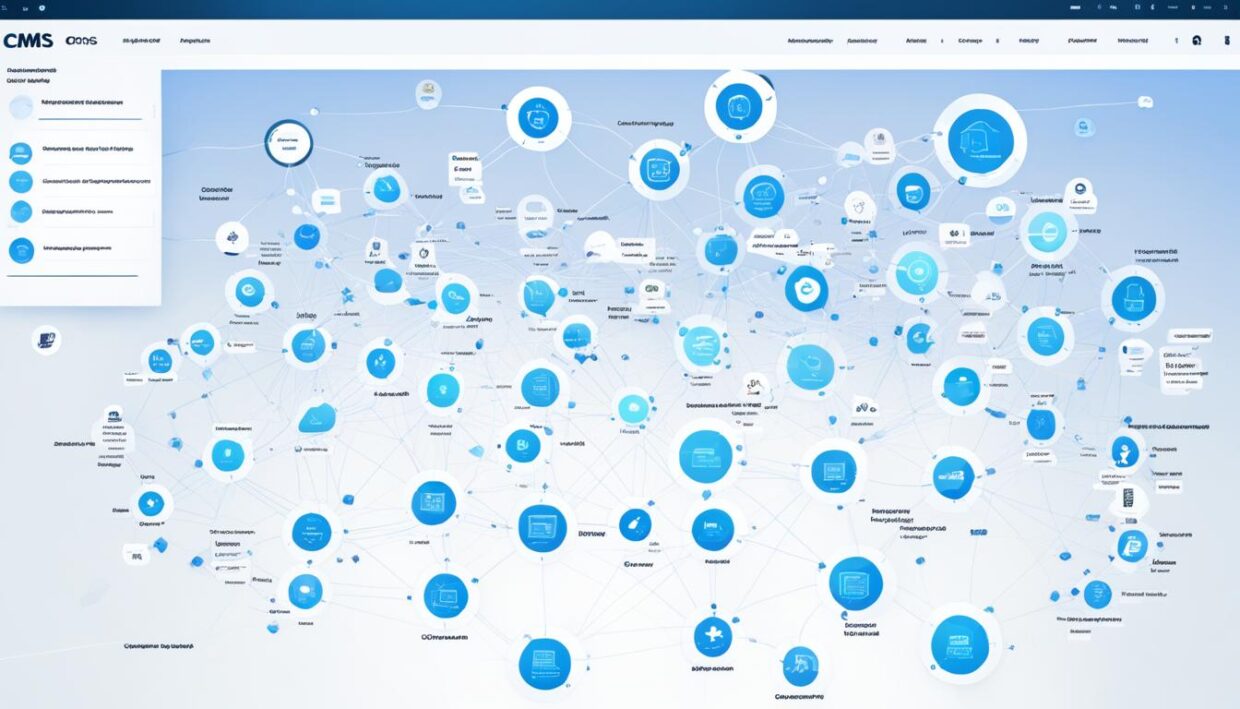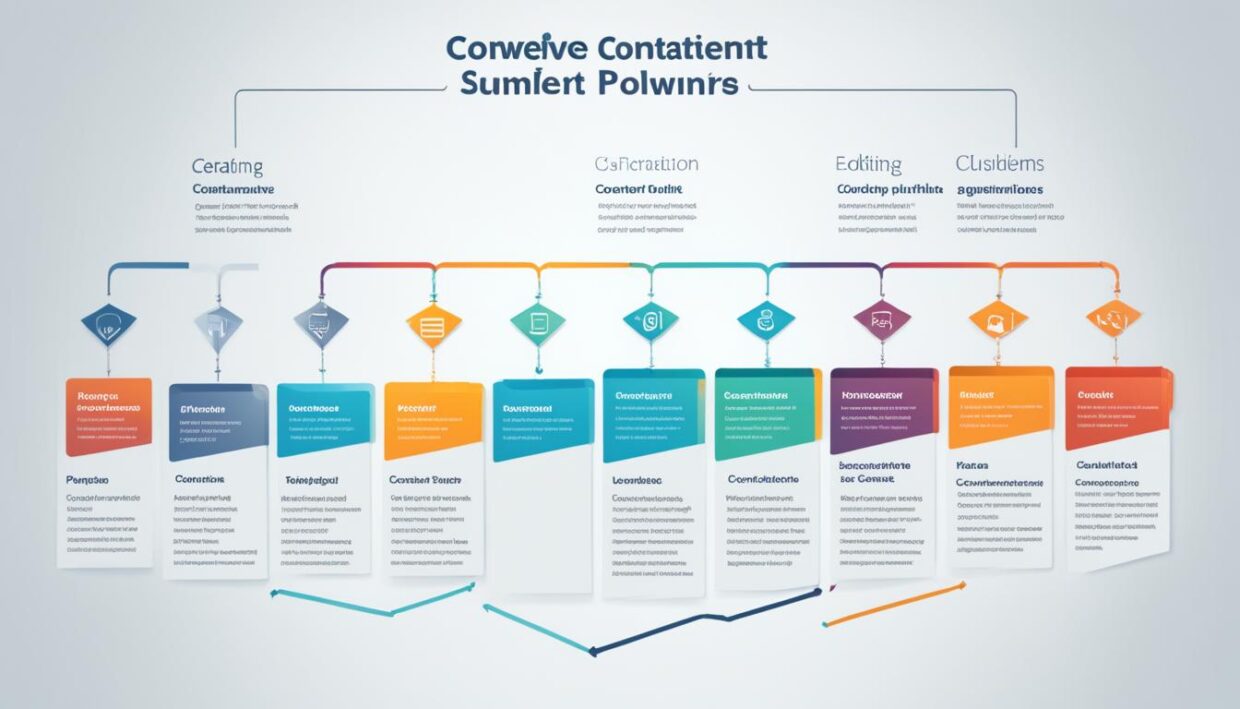
“In the age of information, ignorance is a choice.” – Donny Miller. This insightful observation underscores the importance of accessibility in digital platforms, particularly in content management systems (CMS). CMS solutions are indispensable tools for businesses and individuals aiming to establish a strong web presence without the need for extensive technical prowess. By enabling users to create, manage, and modify digital content easily, content management systems democratize web design, empowering anyone to bring their ideas online.
As the CMS market is projected to generate a staggering $123.5 billion in revenue by 2026, it’s clear that organizations of all sizes recognize the power and potential of these platforms. Large enterprises typically look to their marketing, communications, and IT departments for effective web management. However, small and medium-sized enterprises without dedicated web staff require user-friendly systems to maintain their online visibility. Popular options like WordPress, Joomla, and Drupal not only simplify web operations but also facilitate collaborative content creation, thereby allowing teams to work together seamlessly.
Content management systems offer a comprehensive suite of features that cater to the needs of various users, ensuring that content can be both created and published efficiently. With robust administrative tools, these systems support multiple user roles—such as authors, editors, and administrators—thus enhancing collaboration and ensuring that every piece of content meets organizational standards. As navigating the digital landscape becomes increasingly complex, implementing an effective CMS is essential for streamlining content workflows and ensuring that businesses stay competitive.
Key Takeaways
- Content management systems simplify the process of managing digital content.
- Projected CMS market growth indicates increasing reliance on these platforms.
- User-friendly CMS solutions cater to small and medium-sized businesses.
- Collaboration features of popular CMSs enhance team efforts in content creation.
- Robust administrative tools streamline content management tasks.
What are Content Management Systems?
Content management systems (CMS) serve as essential platforms for managing digital content on websites. Their architecture comprises two main components: a Content Management Application (CMA), which allows content creators to craft and manage their material, and a Content Delivery Application (CDA), responsible for displaying this content to end users. This setup significantly lowers the technical barrier, empowering non-tech-savvy users to update and manage their sites effectively.
Among the prominent players in the CMS landscape, WordPress holds a significant market share, managing over 62.5% of websites that utilize known content management systems. This dominance highlights its user-friendly interface and flexible options, making it a preferred choice for various website types, including e-commerce platforms like Magento.
Other notable content management systems like Joomla, Shopify, and Wix present unique features catering to specific needs. Less recognized platforms often target large enterprises and come with a higher price tag. The versatility of content management systems permits their use across different applications, which can include personal blogs, corporate websites, and digital storefronts.
Different types of content management systems exist, including:
- Coupled CMS
- SaaS CMS
- Decoupled CMS
- Headless CMS
Each of these systems offers unique functionality and deployment options. Coupled CMS, for instance, requires dedicated hosting and specific technologies, while SaaS CMS are cloud-hosted, minimizing setup efforts. On the other hand, decoupled and headless CMS offer more flexibility by separating content management from delivery, ideal for businesses needing custom front-end solutions.

The CMS definition extends to include various features such as user roles, digital asset management, content collaboration, and extensive website building capabilities. These components are particularly valuable for organizations seeking streamlined operations in terms of content governance and business processes. Given the advantages of using a CMS—including improved productivity, content consistency, and scalability—deciding on the right system can significantly influence a business’s online presence.
Importance of Content Management Systems for Businesses
Content Management Systems (CMS) serve as vital tools in establishing and enhancing a business web presence. These platforms have evolved significantly since their inception in the late 1990s and early 2000s, focusing initially on reducing the need for technical expertise. Mid-2000s marked a turning point as user-friendly interfaces from platforms like WordPress and Joomla gained traction, allowing businesses to present a professional online image with ease.
The late 2000s saw open-source CMS platforms dominating the market, with WordPress rising to prominence due to its flexibility, community-driven nature, and cost-effectiveness. As mobile internet usage surged in the 2010s, CMS offerings adapted, emphasizing responsive design to meet the demands of users accessing content on various devices.
Modern CMS platforms have continued to evolve, integrating advanced features like ecommerce capabilities, AI functionalities, and multi-channel content distribution. A user-friendly website management system becomes critical as these features enable businesses to showcase products and services effectively while enhancing user engagement.
The significance of regular content updates cannot be overstated. Timely and up-to-date content boosts a company’s reliability, fostering trust among potential customers. Furthermore, SEO tools built into modern CMS platforms enhance search engine visibility. This optimization drives traffic to a business’s website, creating an essential foundation for driving sales and leads.
Choosing the right CMS is crucial for scalability, ensuring the platform can handle traffic spikes and support growth. Various platforms offer different levels of support, customizability, and security features. Understanding CMS importance is essential for business owners seeking to elevate their competitive edge in an increasingly digital marketplace.

How Content Management Systems Improve User Experience
Content Management Systems (CMS) play a pivotal role in enhancing user experience through efficient website navigation and intuitive interfaces. An effective CMS simplifies content updates, ensuring that users access the most relevant information without unnecessary delays. This ease of use forms the backbone of successful digital marketing strategies, ultimately aiming to foster visitor engagement and satisfaction.
Responsive design has become essential for CMS. With the variety of devices and screen sizes available today, a responsive layout guarantees an optimal viewing experience across all platforms. Users are more likely to stay engaged on sites that adapt seamlessly to their devices. Additionally, CMS platforms often include built-in accessibility features or plugins that improve access for all users, accommodating diverse needs and preferences.
Regular content optimization ensures that web pages remain fresh and relevant. Effective strategies encompass keyword integration, high-quality content creation, image optimization, and internal linking. By monitoring performance and iterating based on user feedback, organizations can continuously refine their digital marketing strategies to serve user needs better.
Moreover, many modern CMS platforms support multimedia content embedding, such as images, videos, and audio files, enriching the overall user experience. Areas for accessibility testing and auditing are integrated within certain CMSs, helping identify issues and providing solutions, ensuring that all users respond positively to the site’s usability.

Types of Content Management Systems
Content Management Systems (CMS) encompass a diverse range of types that cater to distinct business requirements. Understanding these types of CMS is essential for tailoring web solutions and enhancing operational efficiency.

1. Web Content Management Systems (WCMS): These systems specialize in managing the digital components of a website. They empower users to create, modify, and manage content without requiring extensive knowledge of markup languages or programming. Popular examples include WordPress, Joomla, and Drupal.
2. Digital Asset Management Systems (DAM): Designed for effective brand management, these systems centralize digital content, ensuring easy access and streamlined publishing across various platforms. Notable solutions encompass Adobe Experience Manager, Bynder, and Widen Collective.
3. Enterprise Content Management Systems (ECM): Platforms such as SharePoint and Documentum facilitate organizations in managing documents and communications efficiently. They enhance operational efficiency and compliance with regulatory standards.
4. Component Content Management Systems (CCMS): These systems organize content at a granular level, which enables efficient content reuse and can significantly reduce translation costs. Renowned options include SDL Tridion Docs and Vasont.
| Type of CMS | Description | Examples |
|---|---|---|
| Web Content Management Systems (WCMS) | Manage digital components and enable customization without coding knowledge. | WordPress, Joomla, Drupal |
| Digital Asset Management Systems (DAM) | Centralize digital content and provide robust brand management functionalities. | Adobe Experience Manager, Bynder, Widen Collective |
| Enterprise Content Management Systems (ECM) | Streamline document management and enhance regulatory compliance. | SharePoint, Documentum |
| Component Content Management Systems (CCMS) | Facilitate content reusability and reduce translation costs. | SDL Tridion Docs, Vasont |
Organizations should assess their specific requirements when selecting from the various types of CMS available. This promotes optimal performance, cost-effectiveness, and facilitates efficient content management processes.
Web Content Management Systems Explained
A Web Content Management System (WCMS) is a powerful tool that allows organizations to manage digital information efficiently without requiring technical expertise. The WCMS definition centers on its capability to enable users to design, create, and maintain personalized content for a website easily. These platforms store content in databases, offering robust content management capabilities that facilitate the editing and publishing process through a user-friendly browser interface.
Within a WCMS, two main components operate seamlessly: the Content Management Application (CMA) designed for content creators and the Content Delivery Application (CDA) that presents content to website visitors. This structure not only improves content creation but also enhances collaboration among multiple users, with over 85% of WCMS software serving as platforms for shared content management.
Many modern WCMS come equipped with automated publishing features, enabling rapid content distribution while minimizing the risk of errors. Furthermore, approximately 93% of WCMS include workflow management features, providing administrators the ability to create customized rules for content processes. Systems may utilize offline processing, allowing users to refine their contributions before publication, or employ online processing, generating HTML on demand with platforms like Joomla and Drupal.
Security remains a significant concern for WCMS platforms, highlighting the need for regular updates and maintenance to protect against vulnerabilities. Organizations looking to benefit from a WCMS can explore a range of solutions, including popular options like WordPress, Adobe Experience Manager, and Contentful, each offering distinct features tailored to different content management needs.
The integration of SEO capabilities within WCMS enhances business visibility, as roughly 70% of these systems provide tools to improve search engine ranking through effective content creation strategies, keyword optimization, and internal linking. Companies should consider various factors, such as budget and integration requirements, when selecting a suitable WCMS to maximize both cost-effectiveness and productivity.

Digital Asset Management Tools in CMS
Digital Asset Management (DAM) tools integrated into Content Management Systems (CMS) provide a vital resource for businesses seeking efficient strategies for managing digital files. While a CMS primarily focuses on creating and publishing content on websites, DAM systems expand the scope by supporting an organization’s entire library of media assets, including documents, logos, and videos. This distinction plays a crucial role in how teams operate.
The integration of DAM within CMS enhances overall digital asset management by allowing for features such as version control, automated workflows, and user permissions. These functionalities not only streamline the lifecycle of digital assets—from creation to archiving—but they also improve collaboration among team members. For instance, 78% of organizations that implement both DAM and CMS report enhanced workflow efficiency, leading to faster campaign launches and improved content distribution across various channels.

Organizations face challenges in managing digital files effectively, with 85% indicating difficulties without a dedicated DAM solution. A robust DAM system addresses these issues with features like metadata organization, agile workflows, and powerful search capabilities, enabling quick access to assets. This capability is particularly useful as the demand for content has surged, with teams producing 45% more digital content than before, making effective asset management more crucial than ever.
Ultimately, combining CMS functionality with DAM tools creates a single source of truth for managing digital assets. This ensures consistency across various platforms, paving the way for successful marketing campaigns and enhanced content management processes. Industries such as technology, education, and real estate particularly benefit from these integrated tools, showcasing their necessity in today’s digital landscape.
Enterprise Content Management Solutions
Enterprise Content Management (ECM) solutions play a critical role for organizations looking to manage documents and information effectively throughout their lifecycle. These systems enhance business compliance while significantly improving efficiency and streamlining operations. With ECM, businesses can reduce reliance on paper, improve customer service, and increase productivity.
Leading ECM solutions, such as Laserfiche and DocuWare, focus on capturing documents digitally. This includes invoices, contracts, and research reports through various methods like scanning and electronic forms. Such approaches mitigate the challenges associated with paper-based storage systems, including duplication and retrieval difficulties. Storing documents in a digital repository simplifies access control, enables metadata searching, and allows for flexible folder organization.

Automation features within ECM systems add to the value by routing documents and alerting staff to required actions, enhancing overall accuracy. Customizable security settings help protect sensitive information from unauthorized access, ensuring data privacy is maintained. With the market projected to grow significantly, businesses across various sectors such as healthcare, finance, and government can leverage ECM’s capabilities to improve compliance and mitigate risks.
As the demand for effective document management systems continues to rise, organizations are encouraged to explore solutions that match their unique needs. By utilizing resources like buyer’s guides and product marketplaces, companies can make informed decisions to implement the right enterprise CMS for their ongoing success.
Advantages of Using Content Management Systems
Content Management Systems (CMS) offer significant advantages that can transform how organizations operate. Many organizations experience enhanced website management efficiency with a CMS as it centralizes content, allowing teams to create, manage, edit, and publish across multiple platforms with ease. This centralization not only simplifies workflow but helps to streamline operations by eliminating the need for web developers or webmasters for routine content updates.

One of the key CMS benefits is the built-in SEO capabilities, which are essential for successful organic performance. A good CMS typically comes equipped with tools that support search engine optimization, enhancing visibility in search results. Furthermore, analytics are integrated into many CMS platforms, providing robust metrics that help track visitor behavior. Organizations can leverage this data to adapt and evolve their content strategy effectively.
- Easy integrations with existing marketing stacks.
- Access to plug-ins and add-ons to enhance functionality.
- Reduced website maintenance costs due to user-friendly interfaces.
Investing in a CMS proves worthwhile, as it significantly contributes to business growth and customer experience. A well-chosen CMS can lead to a marked reduction in hidden costs associated with implementation, support, and necessary training. Additionally, many businesses find it increasingly challenging and expensive to customize proprietary solutions or migrate to different platforms.
Having a CMS allows organizations to archive content efficiently, retaining valuable information for future reference. As digital landscapes evolve, the ability to adapt and maintain a robust digital presence becomes imperative for ongoing success.
Common Features of Effective CMS Platforms
Effective Content Management Systems (CMS) come equipped with essential CMS features that enhance user experience and streamline processes. A user-friendly dashboard, for instance, allows content creators to navigate easily through various functionalities. Content authoring tools facilitate smooth editing and customization of digital assets, ensuring that even users with minimal technical expertise can contribute effectively.

Workflow management plays a key role in maintaining efficiency. Automated approval processes and version control help mitigate the risk of data loss or unapproved content going live. Studies suggest that a substantial 75% of websites lack proper version control, which can lead to significant vulnerabilities. Businesses must prioritize CMS platforms that integrate robust workflow management capabilities to safeguard their content.
In today’s global marketplace, multilingual support within a CMS is vital. A survey indicates that 60% of businesses seek platforms that cater to international audiences. Providing localized content not only complies with regional regulations but also enhances user engagement. CMS platforms featuring responsive themes have shown a 40% increase in user engagement, showcasing the knowledge that users access content across various devices.
On-page SEO tools are another critical feature. Analysis has revealed that sites with built-in SEO functionalities are 50% more likely to achieve higher rankings. This capability aids in improving visibility on search engines, making it indispensable for businesses focused on digital marketing. Additionally, incorporating detailed analytics can empower organizations to understand their audience’s preferences, guiding future content strategies.
Effective integration with external applications can further enhance a CMS’s functionality. Statistics show that over 70% of businesses utilize robust integrations to boost workflow efficiency. This flexibility allows organizations to customize their online presence according to specific needs, ensuring resilience and scalability as they grow.
How to Choose the Right Content Management System
Choosing the right Content Management System (CMS) is a crucial decision for any business. Evaluating various CMS selection criteria ensures that organizations find a platform that suits their operational needs and future growth potential. Understanding usability, customization capabilities, scalability, security, and support options plays a significant role in the selection process.
Scalable CMS options are particularly important for businesses anticipating growth. Over the last decade, many organizations have experienced negative consequences due to poor CMS choices, underscoring the need for careful evaluation. Developing a long-term strategy when considering a CMS is advisable, highlighting the importance of partner involvement for successful implementation.

- Assess existing technology: Validate the need for a new CMS while determining if updating current technology could suffice.
- Consider budget: Factor in the overall costs associated with the CMS, including potential hidden costs as usage grows.
- Evaluate functionality: Different CMS platforms offer various functionalities that align with specific business needs.
- Involve stakeholders: Engage diverse perspectives to visualize and organize content effectively.
Usage scenarios provide insights into how CMS products align with diverse content management needs. A user-friendly interface and the ability to integrate seamlessly with e-commerce systems or CRM software are essential attributes. Organizations should avoid building custom or in-house content management solutions, given the historically high failure rates associated with such systems.
| Criteria | Considerations |
|---|---|
| User-Friendliness | Ease of use increases user satisfaction and efficiency. |
| Scalability | The system should accommodate future growth and content expansion. |
| Integration | APIs and support for other apps enhance compatibility. |
| Support | Assess documentation quality and vendor reliability. |
| Performance | Consider responsiveness and load times for optimal user experience. |
Testing the CMS with a proof-of-concept before full implementation allows businesses to mitigate potential issues. Avoid solely relying on feature matrices as many features require additional work for proper functionality. A thorough assessment of how frequently content updates occur and the need for collaborative content authoring support will ultimately guide organizations toward a suitable CMS selection.
Content Workflow Management within CMS
Content workflow management is a crucial component of any Content Management System (CMS). It facilitates the seamless coordination of editorial processes within an organization. All participants involved in content creation can benefit from the collaborative features offered by various CMS management tools. Multiple team members can manage and update content in real-time, ensuring efficiency and responsiveness to market demands.

CMS platforms allow users to create customizable workflows for their editorial processes. The inclusion of publishing controls, content editing tools, and content staging enhances the ability to maintain high-quality outputs. Features like analytics and security measures provide insights into content performance while ensuring data safety. Organizations can ask essential questions about security, such as whether the CMS has a web application firewall or if it provides security audits and vulnerability scans.
The varying architecture of CMS, including traditional and decoupled systems, offers different levels of complexity based on organizational needs. Traditional CMS platforms support “What You See Is What You Get” (WYSIWYG) editing, suitable for simpler sites. In contrast, decoupled or headless CMS platforms offer a separation of content creation and design, accommodating more intricate processes.
To highlight some effective use cases of CMS management tools, consider the following:
| Feature | Traditional CMS | Decoupled CMS |
|---|---|---|
| User-friendliness | High | Moderate to High |
| Complexity | Low to Moderate | High |
| Collaboration | Good | Excellent |
| Content Ownership | Moderate | High |
| Implementation time | Less Time-consuming | More Time-consuming |
Understanding the capabilities of content management systems and the importance of effective content workflow management enables businesses to streamline their editorial processes. This results in enhanced content quality and better alignment with audience needs.
Collaboration Software and Content Management Systems
Effective content management depends significantly on the ability to work collaboratively. Many Content Management Systems (CMS) integrate advanced collaboration software that enhances teamwork among content creators, editors, and marketers. These collaboration features often include shared workspaces, feedback tools, and integrated project management capabilities. They help streamline cooperation and allow team members to contribute input and ideas efficiently during the content creation process.

Utilizing CMS collaboration tools can transform team content management by providing a centralized platform for communication and feedback. These tools allow for seamless sharing of documents, version control, and tracking of changes, ensuring that everyone stays on the same page. Teams can work on projects in real time, which fosters transparency and quick decision-making.
“Successful collaboration in content management leads to better quality content and faster turnaround times.”
The integration of powerful collaboration features into CMS platforms supports various industries, especially as remote work becomes more prevalent. Teams can manage content creation processes from different locations without compromising efficiency or communication. As a result, companies can maintain productivity and creativity while navigating the complexities of modern digital environments.
| Feature | Description | Benefit |
|---|---|---|
| Shared Workspaces | A collaborative area where team members can access and edit work | Enhances teamwork and ensures everyone has updated access |
| Feedback Tools | Facilities for giving and receiving real-time feedback | Improves content quality through constructive input |
| Project Management | Aligns tasks and deadlines for efficient workflow | Ensures timely delivery and accountability among team members |
Embracing these collaboration features can significantly improve overall productivity and the quality of content produced. Teams equipped with effective CMS collaboration tools are better positioned to adapt to changing market demands while maintaining high standards of content output.
Optimizing SEO with Content Management Systems
Content Management Systems present a unique opportunity for businesses aiming to enhance their online presence through CMS SEO optimization. These platforms, including well-known systems like WordPress, Joomla, and Shopify, provide users with integrated tools that empower them to create and manage digital content effectively.
On-page elements play a crucial role in search engine optimization. With features designed for optimizing titles, meta descriptions, headings, and URLs, CMS platforms significantly contribute to improving content visibility. Users can ensure that each page is not only keyword-rich but also descriptive, aligning with best practices in SEO.
Performance factors such as site speed are essential for effective SEO strategies. Many CMS platforms include capabilities for optimizing images, enabling caching, and minifying CSS and JavaScript files to enhance load times. Since mobile devices account for over 60% of organic search visits, a mobile-friendly design is indispensable. CMS solutions often provide responsive themes that adapt to various screen sizes, ensuring a seamless user experience that can boost web traffic improvement.
The technical aspects of SEO, such as configuring robots.txt files, XML sitemaps, and schema markup, are straightforward for users of content management systems. Integrations with analytics tools further allow website owners to monitor performance metrics and adjust strategies accordingly. With 64% of marketers actively investing in SEO, utilizing these systems can lead to significant advancements in digital marketing strategies.

| Feature | Benefits for SEO |
|---|---|
| Built-in SEO tools | Facilitate keyword integration and meta-description management |
| Mobile responsiveness | Boosts traffic from mobile devices |
| Performance optimization | Enhances site speed, a crucial ranking factor |
| URL customization | Improves search engine rankings with keyword-rich URLs |
| Structured data implementation | Enhances visibility through rich snippets |
| Social media integration | Increases brand exposure and user engagement |
In summary, the CMS landscape offers a variety of features that support effective SEO practices. With the right approach, businesses can leverage these tools to boost content visibility, enhance user experience, and drive substantial web traffic improvement.
Conclusion
In today’s digital landscape, understanding the CMS overview is crucial for any business aiming to thrive online. Content Management Systems provide a streamlined approach to web content management, drastically enhancing the way organizations create, edit, and publish content. With user-friendly interfaces and customizable options, even non-technical users can manage their websites effectively, bringing a multitude of web content management benefits.
The impact of choosing the right CMS on your digital marketing strategy cannot be understated. It not only simplifies collaboration among team members but also ensures that your content is optimized for search engines, driving more traffic to your website. Whether you opt for open-source platforms like WordPress and Joomla or go for proprietary solutions, the scalability and security features offered by modern CMS can significantly influence your online success.
As online content publishing continues to grow across various industries, investing in a suitable CMS remains an essential step. Understanding the unique functionalities and advantages of different systems helps organizations adapt more readily to changing market demands, ultimately maximizing their digital marketing impact and ensuring a strong online presence.





















Be the first to leave a comment